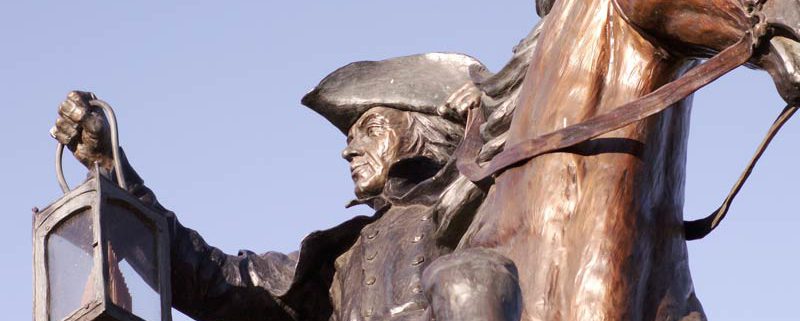Listen my children and you shall hear
Of the midnight ride of Paul Revere…
We are all familiar with Henry Wadsworth Longfellow’s famous poem recounting the exploits of one of our most renowned patriots, Paul Revere. As such, we all know that Paul Revere singlehandedly warned the Massachusetts countryside of the coming attack by the British regulars, helping the colonists to defeat the British in the first small battles of the Revolutionary War.
Except that it’s not true.
Longfellow’s famous poem was actually written in 1860 many years after the end of the Revolutionary War. In fact, the poem had absolutely nothing to do with Revolutionary zeal and was instead intended to appeal to the Northerners’ sense of urgency and patriotism as the nation entered into the Civil War. The poem’s final stanza is actually a call to action, urging readers to remember the patriotism and courage of the birth of the nation:
A cry of defiance, and not of fear,
A voice in the darkness, a knock at the door,
And a word that shall echo for evermore!
For, borne on the night-wind of the Past,
Through all our history, to the last,
In the hour of darkness and peril and need,
The people will waken and listen to hear
The hurrying hoof-beats of that steed,
And the midnight message of Paul Revere.
This poem is often the people’s primary source of information regarding the midnight ride, but the truth of the night of April 18, 1775 is very different from the story related in Longfellow’s poem. Among the historical inaccuracies are:
- The focus on Paul Revere. The midnight ride of April 18 was actually undertaken by several men, including William Dawes, Samuel Prescott, and dozens of other men whose names did not survive history. Longfellow (and history) gave Revere the credit primarily because his name rhymed better than Dawes’s or Prescott’s.
- The lantern signal. While there was a lantern signal hung in the tower of the Old North Church, the signal was not meant for Revere. The signal was actually from Revere as he was the man who arranged for the church sexton to hang the lanterns.
- Revere’s cry. Revere did not wander the countryside yelling “The British are coming!” For one thing, Revere was trying to elude British soldiers – screaming out a warning would have been a pretty dumb move. Secondly, most colonists still considered themselves to be British – they would have been pretty confused by the phrase, “The British are coming.”
- Revere’s success. The poem implies that Revere’s mission was a complete success. Revere had intended to ride to Lexington to warn John Hancock and Samuel Adams of the movements of the British regulars (which he did) and then on to Concord where the militia’s arsenal was hidden. Revere never finished his ride – the only rider to actually complete the mission was Samuel Prescott.
While Longfellow’s poem is certainly an example of patriotic writing, it should never be considered an accurate source of historical information. (Neither, apparently, should Sarah Palin, who famously said that Paul Revere warned the British by ringing bells; Palin offers sound proof that our public education system’s handling of American history education leaves much to be desired.) So the next time that someone tells you that Paul Revere saved the nation, don’t be afraid to show a little skepticism.



